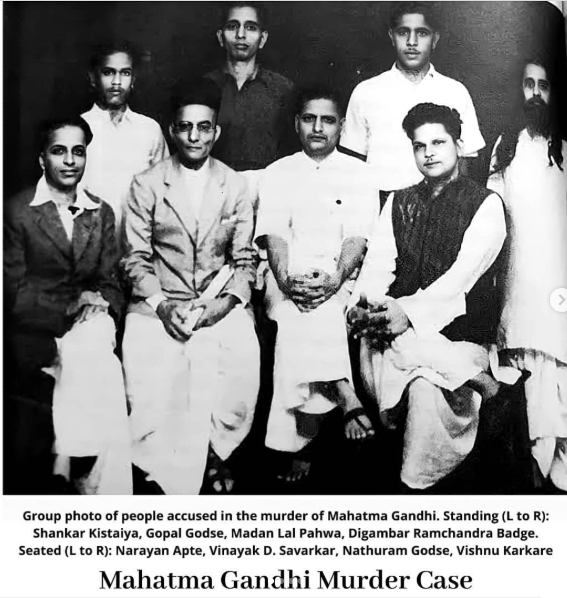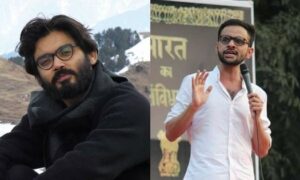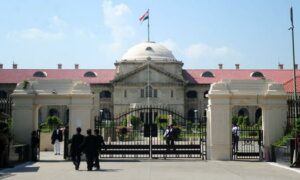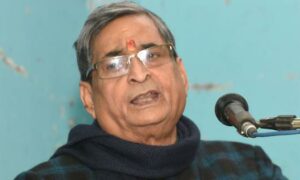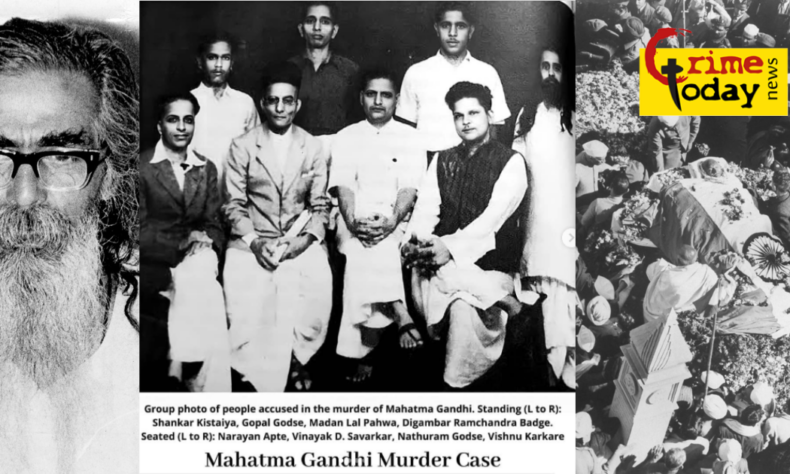
RSS Meeting at Rohtak Road, Delhi Golwalkar’s Controversial Speech on Muslims and Gandhi
By Naveed Uddin Khan Uzair
Delhi, December 8, 1947
Just a few months after India’s independence, a significant meeting of the Rashtriya Swayamsevak Sangh (RSS) took place on Delhi’s Rohtak Road. Approximately 2,500 RSS volunteers attended the event, which was held behind closed doors, with strict instructions barring outsiders from attending. However, a plain-clothed policeman named Kartar Singh managed to be present at the gathering and documented the event in a detailed report.
Golwalkar’s Speech — A Call for Expulsion and Suppression
According to Kartar Singh’s report, RSS chief M. S. Golwalkar delivered a fiery speech to the gathered volunteers. He is reported to have declared, “There is no power in the world that can keep Muslims in India. They will have to leave the country. A Muslim will not remain in India.”
Golwalkar’s remarks were not limited to the Muslim community; he also referenced Mahatma Gandhi, saying, “As far as Gandhi is concerned, we have ways to silence him.” These chilling words were captured in the report, which has since raised concerns about the extremist ideology being promoted within the RSS ranks during that period.
Golwalkar’s Ideological Foundation — Inspired by Hitler?
For those who doubt the authenticity of Kartar Singh’s report, references to Golwalkar’s own writings provide further evidence. In his book “We, or Our Nationhood Defined,” Golwalkar praises Adolf Hitler’s policies, particularly his treatment of minorities in Germany. He describes Muslims in India as a “foreign race” and insists that they must assimilate into the Hindu culture if they wish to remain in the country. According to Golwalkar, Muslims should “bow their heads in front of the Hindu nation,” with no right to citizenship or privileges.
His ideological stance is grounded in the belief that minorities must either fully integrate into the dominant Hindu culture or face expulsion—a notion that echoes the apartheid-like segregation policies seen in South Africa.
The Constitution Rejects Golwalkar’s Vision
When the foundation for independent India was laid, and the Constitution was drafted, the inclusive and progressive ideals of leaders like Jawaharlal Nehru and Dr. B.R. Ambedkar prevailed. Contrary to Golwalkar’s vision, the Indian Constitution enshrined the values of justice, liberty, equality, and fraternity, ensuring that all citizens, irrespective of religion, would enjoy equal rights and protections under the law.
Despite the brutality of Partition, Hindus and Muslims stood together to reject religious segregation, embracing the principles of communal harmony. This spirit of unity was woven into the fabric of India’s Constitution, symbolizing a collective dream of coexistence and mutual respect.

Why Golwalkar’s Ideology Still Matters
The question arises: Why revisit Golwalkar’s controversial ideology today? Decades later, his thoughts seem to be resurfacing in political discourse, subtly influencing public opinion and state policies. Recent trends indicate a growing narrative of division, with policies and rhetoric that appear to echo Golwalkar’s vision of a Hindu-centric nation.
From economic boycotts and social segregation to political marginalization, India’s socio-political landscape is witnessing increasing instances of exclusion against minority communities, particularly Muslims. Political campaigns that once focused on development, GDP growth, and economic reforms have now shifted towards identity-based politics, with references to religious and cultural divisions taking center stage.
A Dangerous Path — The Shadow of Apartheid
The echoes of apartheid—an institutionalized system of racial segregation and political and economic discrimination—now seem to resonate in some of India’s policies. The strategy appears to be one of division: creating a second-class citizenship where minorities are socially and economically marginalized, reminiscent of the policies once enforced in South Africa.
Human rights activists have raised alarms, warning that such segregation undermines the constitutional promise of equality and justice for all. Critics argue that these policies are a strategic distraction from issues like economic decline, unemployment, and governance failures, shifting public focus to religious and cultural conflicts.
The Need for Reflection and Unity
Golwalkar’s dream of a homogeneous nation, free of Muslims, was starkly rejected by the framers of the Indian Constitution. The idea of an inclusive India remains a powerful counter-narrative to divisive ideologies. It is crucial now more than ever to reflect on the values that shaped India’s independence: unity in diversity, communal harmony, and equal citizenship for all.
As India navigates its path forward, the choice remains: to adhere to the principles of its Constitution or to veer towards ideologies that threaten to fracture its social fabric. The lessons of history are clear, and the responsibility to uphold justice, liberty, and equality rests with every citizen who believes in the vision of a united and inclusive India.
Promotes Divisive Ideology:
-
-
RSS is known for promoting a vision of India based on Hindu nationalism, which can marginalize religious and cultural minorities.
-
Contradicts Secular Values:
-
-
India’s Constitution guarantees secularism and equal rights for all religions, while RSS advocates for a Hindu-centric state, conflicting with constitutional principles.
-
Undermines Social Harmony:
-
-
The organization’s ideology often fosters communal tensions, leading to mistrust and violence between communities.
-
Historical Associations with Violence:
-
-
RSS has been linked to incidents of communal violence, including riots and attacks against minorities, which disrupts peace and security.
-
Anti-Pluralistic Views:
-
-
RSS ideology opposes India’s historical diversity, promoting a singular cultural identity that ignores the country’s rich multi-ethnic heritage.
-
Hostility Towards Muslims and Christians:
-
-
The organization has a history of viewing Muslims and Christians as “outsiders,” which goes against India’s spirit of unity and coexistence.
-
Opposition to Gandhi’s Vision of India:
-
-
RSS’s ideological stance was fundamentally opposed to Mahatma Gandhi’s vision of a secular, inclusive India, culminating in Gandhi’s assassination by Nathuram Godse, who had RSS ties.
-
Attempts to Rewrite History:
-
-
RSS affiliates often attempt to distort historical narratives to fit their ideological beliefs, undermining academic freedom and factual accuracy.
-
Political Influence on Governance:
-
-
Through its political arm, BJP, RSS influences policies that reflect its ideology, impacting education, culture, and civil liberties.
-
Suppression of Dissent:
-
Critics of RSS or its ideology are often labeled as “anti-national,” leading to suppression of free speech and political opposition.
Economic Boycotts and Social Exclusion:
-
RSS-backed campaigns have promoted economic boycotts against minority-owned businesses, fueling social and economic marginalization.
Militaristic Approach to Patriotism:
-
RSS promotes a militaristic form of nationalism that prioritizes force over dialogue, which can escalate conflicts rather than resolve them.
Discourages Interfaith Harmony:
-
Its ideology discourages interfaith marriages and community interactions, fragmenting the social fabric of the nation.
Gender Inequality:
-
The organization’s conservative views often restrict women’s roles and discourage gender equality in social and political spaces.
Threat to Democracy:
-
Its vision for India leans towards a majoritarian rule, undermining democratic principles of equal representation and minority rights.
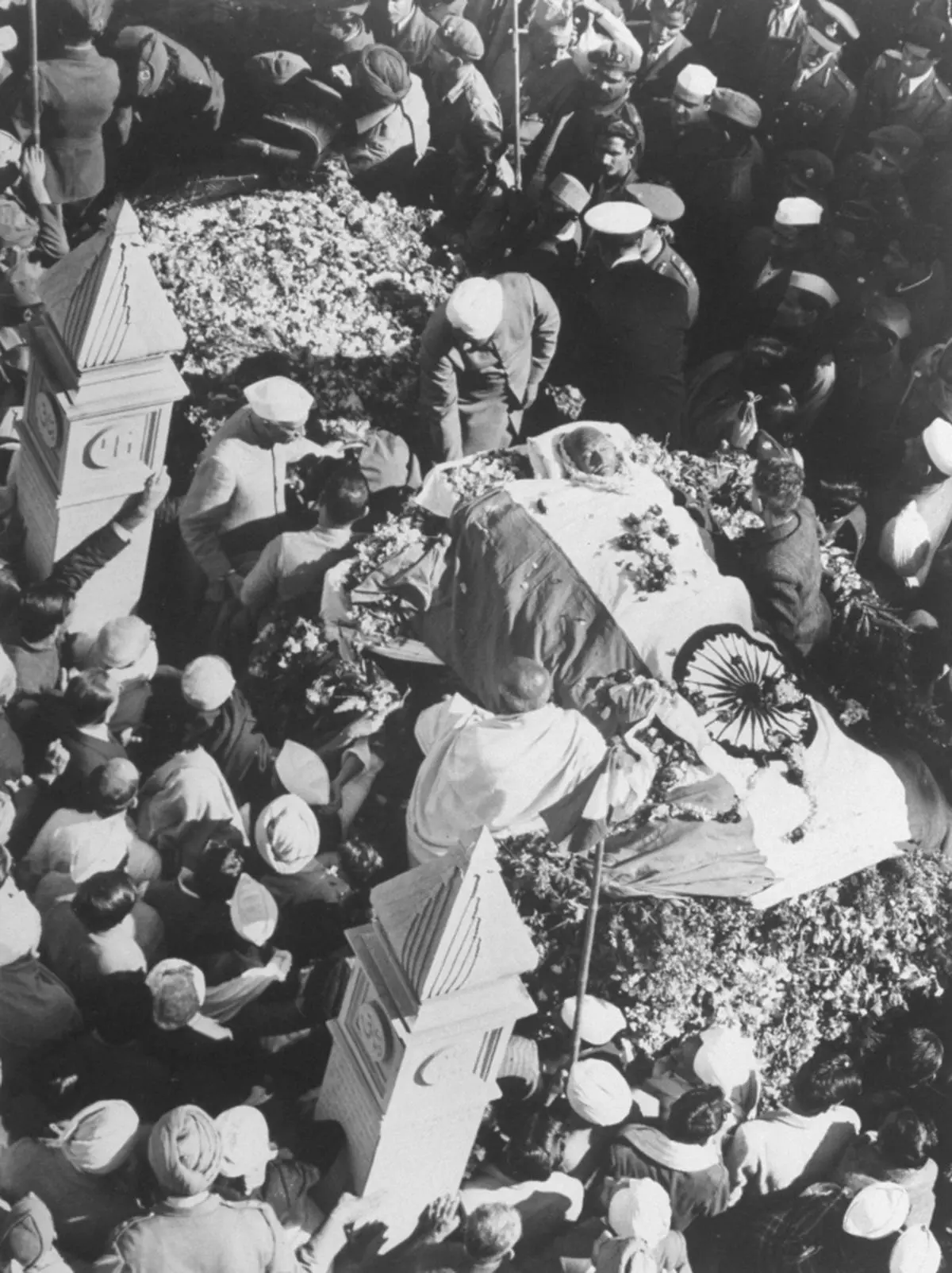
The nation was shaken to its core on this fateful day when Mahatma Gandhi, the Father of the Nation, was assassinated by Nathuram Godse. The assassination was not just the act of an individual but the culmination of an ideology that had been brewing against Gandhi’s vision of a secular and inclusive India—an ideology rooted in the beliefs of the Rashtriya Swayamsevak Sangh (RSS).
Who Killed Mahatma Gandhi?
Nathuram Vinayak Godse, a staunch follower of the RSS and a former member of the Hindu Mahasabha, pulled the trigger that ended the life of Mahatma Gandhi. On January 30, 1948, during Gandhi’s evening prayer meeting at Birla House in New Delhi, Godse approached him under the guise of seeking blessings and shot him three times at point-blank range. Gandhi fell to the ground, uttering his final words, “He Ram.”
The Ideological Conflict
The roots of the assassination trace back to the ideological differences between Gandhi’s vision of a united, inclusive India and RSS’s Hindu nationalist agenda.
-
Gandhi believed in a secular India where Hindus, Muslims, Sikhs, Christians, and people of all faiths could live together peacefully.
-
On the other hand, the RSS, led by its chief ideologue M.S. Golwalkar, advocated for a Hindu Rashtra (Hindu Nation), where Hindu culture and values were dominant, and minorities had to “assimilate or leave.”
Godse, influenced by these ideologies, viewed Gandhi as an obstacle to this vision. He held Gandhi responsible for what he believed was the “appeasement” of Muslims during the Partition of India and the violence that followed.
Godse’s Association with RSS
Nathuram Godse had been a member of the RSS from a young age and was deeply involved in its activities. He trained in its shakhas (branches) and imbibed its principles of Hindu nationalism. Although the RSS officially distanced itself from Godse after the assassination, historical records and Godse’s own testimony during his trial indicated his deep ties to the organization.
-
In his courtroom statement, Godse justified his actions, citing Gandhi’s “weak stance” towards Muslims and his support for Pakistan’s financial dues as primary motivations.
-
He claimed that Gandhi’s principles of non-violence and communal harmony were weakening the strength of Hindus in their own nation.
RSS and Its Ideology
The RSS was founded in 1925 by Keshav Baliram Hedgewar with the purpose of promoting Hindu unity and creating a “Hindu Rashtra.” Its leadership, particularly Golwalkar, openly admired fascist principles and believed that minorities like Muslims and Christians should either accept Hindu dominance or forfeit their citizenship rights.
-
In Golwalkar’s book, We or Our Nationhood Defined (1939), he expressed admiration for Nazi Germany’s “solution” to the Jewish question, drawing parallels to his vision for India’s Muslims.
-
His writings rejected the concept of a multicultural society, advocating instead for a singular Hindu cultural dominance.
Aftermath and Ban on RSS
Following Gandhi’s assassination, the Indian government, led by Prime Minister Jawaharlal Nehru and Home Minister Sardar Vallabhbhai Patel, imposed a nationwide ban on the RSS.
-
The government cited the organization’s extremist ideology and its role in inciting communal violence as primary reasons for the ban.
-
Thousands of RSS members were arrested, and its operations were forced underground.
-
The ban was lifted in 1949, after the RSS pledged to remain non-political and accept the Constitution of India.
Legacy of Hatred or Path to Unity?
Mahatma Gandhi’s assassination remains a stark reminder of how divisive ideologies can lead to violence and disrupt the fabric of a nation. His dream of a united India—where people of all faiths coexist peacefully—was momentarily shattered but not destroyed. Today, Gandhi’s principles of non-violence, truth, and unity continue to inspire millions, while the ideological clash between secularism and nationalism still shapes the political discourse in India.
Golwalkar’s Vision: A Hindu Nation Without Muslim Influence?
In “We, or Our Nationhood Defined,” Golwalkar praised Adolf Hitler’s treatment of minorities, suggesting that a similar approach could be considered for India’s Muslims. He described Muslims as a “foreign race,” asserting that they must either assimilate entirely into Hindu culture or forfeit their rights as citizens. His words reflect a worldview that denies space for multiculturalism, instead pushing for a homogenized national identity based solely on Hindu traditions and beliefs.
Golwalkar’s ideology explicitly rejected the inclusive nationalism envisioned by Mahatma Gandhi, Jawaharlal Nehru, and Dr. B.R. Ambedkar. Unlike the Indian Constitution, which guarantees equal rights and protections for all citizens regardless of religion, caste, or creed, Golwalkar’s vision sought to exclude Muslims and Christians from the idea of Indian nationhood.
Current Policies and Social Exclusion
Critics argue that recent policies echo Golwalkar’s ideology, incrementally turning Muslims into second-class citizens:
-
Citizenship Amendment Act (CAA) and National Register of Citizens (NRC): The CAA provides a pathway to citizenship for refugees from neighboring countries, explicitly excluding Muslims. Coupled with the NRC, fears emerged that many Muslims could be rendered stateless.
-
Anti-Conversion Laws: Several states have enacted laws restricting religious conversions, with Muslims often targeted under accusations of “Love Jihad.”
-
Demolition Drives: In recent years, demolition drives in predominantly Muslim neighborhoods have been criticized as state-led acts of discrimination, often justified under “anti-encroachment” policies.
-
Economic Boycotts: Grassroots campaigns calling for boycotts of Muslim-owned businesses have gained traction in certain regions, pushing economic segregation.
-
Educational Changes: Revisions in history textbooks have been accused of erasing Muslim contributions to India’s heritage, reinforcing a singular narrative.
Rising Islamophobia: A Reflection of Golwalkar’s Ideology?
Reports of violence and discrimination against Muslims have seen a disturbing rise. From mob lynchings over allegations of cow slaughter to targeted violence during communal riots, Muslims are increasingly finding themselves isolated and under threat. Human rights organizations have repeatedly raised concerns over the growing atmosphere of fear and exclusion, particularly in states governed by leaders with close ties to the RSS.
Many political analysts suggest that this surge in Islamophobia is not incidental but ideological, rooted in Golwalkar’s vision of a Hindu Rashtra. His writings criticized the idea of “appeasing minorities,” promoting instead the idea of a singular cultural dominance.
Constitution vs. Ideology: A Battle for India’s Soul
The Indian Constitution stands as a counter-narrative to Golwalkar’s ideology. Dr. B.R. Ambedkar, the principal architect of the Constitution, enshrined principles of secularism, equality, and social justice—values that reject religious superiority. Article 14 guarantees equality before the law, while Article 15 prohibits discrimination based on religion, race, caste, or place of birth.
Yet, the question remains: Are these constitutional promises being honored? With mounting evidence of exclusionary practices, many argue that India is veering away from its foundational principles towards a society where Muslims are treated as second-class citizens—a reality that Golwalkar had envisioned nearly eight decades ago.
The Way Forward: Reclaiming Constitutional Values
If India is to rise as a global leader and maintain its democratic fabric, it must confront the creeping ideology of religious majoritarianism. It is crucial for civil society, political leaders, and ordinary citizens to reaffirm their commitment to India’s pluralistic heritage. Gandhi’s vision of a united India, where all religions coexist peacefully, must serve as the compass for progress.
The path forward must prioritize unity over division, inclusivity over exclusion, and constitutional values over ideological extremism. The dream of a secular, inclusive India cannot be realized by turning a blind eye to the marginalization of any community, for the strength of a nation is measured by how it treats its most vulnerable.
Conclusion: Rising India: Unity Beyond Divides
As India stands at the crossroads of its historical legacy and future ambitions, it is crucial to reflect on the values that form the backbone of our nation. For centuries, India’s strength has been its diversity—an intricate tapestry woven with threads of different religions, languages, and cultures. This unity in diversity is not just a slogan but the essence of what has kept India thriving despite challenges that would have torn lesser nations apart.
The RSS ideology, as presented in its earlier narratives, sought to redefine the fabric of Indian society through exclusion and singularity. However, the vision of our founding fathers was different; it was inclusive, progressive, and rooted in justice and equality. Mahatma Gandhi, Jawaharlal Nehru, Sardar Patel, Maulana Azad, and Dr. B.R. Ambedkar imagined an India where every citizen, regardless of religion, caste, or creed, would have equal rights and opportunities. This was the dream that culminated in the Indian Constitution—a beacon of secularism, democracy, and unity.
The battles fought during the freedom movement were not won by one community alone; they were a collective struggle where Hindus, Muslims, Sikhs, Christians, and many others fought side by side for a common cause—freedom and justice. The blood spilled on the soil of Jallianwala Bagh, the sacrifices during the Non-Cooperation Movement, and the unity displayed during the Quit India Movement are proof that the real strength of India lies in its collective spirit.
Today, as divisive ideologies attempt to segregate us on religious lines, it is vital to remember that our progress as a nation is linked to our unity. Hindu and Muslim communities have coexisted for centuries, sharing cultural practices, language, food, and even places of worship. From the bustling lanes of Chandni Chowk to the serene ghats of Varanasi, the spirit of unity has always triumphed over attempts to divide.
India’s rise as a global power cannot be achieved in fragments. Economic growth, technological advancement, and global leadership demand internal stability and unity. Sectarian divisions only serve to weaken our collective strength, distracting us from addressing real challenges like poverty, education, healthcare, and innovation.
The ideology that aims to create an India exclusive to one community is not just a betrayal of our Constitution but also a rejection of our shared history. The real essence of patriotism is not found in exclusion but in inclusion—not in division, but in unity.
If India is to truly rise as a global leader, it must do so with all its citizens standing shoulder to shoulder, transcending differences and embracing the shared dream of prosperity and peace. Let us reject divisive narratives and work together to build an India that is stronger, more inclusive, and a beacon of unity for the world.
Jai Hind.
This article is published by Crime Today News ©

